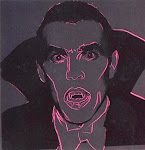As part of the course, students must write a piece inspired by the novel. This forum allows students to form a virtual book group or reading journal, in which they may track ideas and inspirations for future writing.
So... what do we find in Chapter 1?
We find traits of typical gothic fiction: a narrator who dismisses warnings in the name of reason or 'business to be done' yet finds himself rather uneasy. This uneasiness, in turn, builds tension in the reader. Tension also rises because, in some ways, we may find the narrator naive - he trusts Dracula; sees nothing strange in being his 'friend'; takes his advice on places to stay. The undercurrent of fear runs deep - Jonathan's landlord 'refused to speak further'; his wife 'implored' him not to go; the people talk of were-wolves or vampires... and yet... what is Harker's response? To make a memorandum... 'must ask the Count about these superstitions' Convincing? Hmm.... possibly not!
Stoker not only builds tension - he also appeases it, calling upon the 'sublime' to inform his descriptions of the countryside: 'the lofty sweeps of the Carpathians', emphasised by Harker's companion's response - 'he crossed himself reverently', but this awe of God's creation is needed... soon the descriptions become more familiar in their gothic overtones - note the shining 'silver' birch stems, the cart with the 'snake-like vertebra', the 'darkness closing in', the 'ghost-like clouds'. As they approach the Count, there is a final drum roll - an increase in frantic activity, accompanied by the 'dark rolling clouds'. A storm is afoot. Wait for it....
And there he is, in disguise... did you spot him? Driving the coach of four coal black horses, the lamplight, of course, falls on his mouth: 'with very red lips and sharp-looking teeth, as white as ivory'. And, as if this wasn't enough - note his welcome by the choir of wolves! (my words - not a quote!)
How does Stoker use this? Look at the way the wolves affect the horses, the dogs and the narrator. It is often thought that animals have a sixth sense - they're often used to up the tension - how do the horses respond? Meanwhile, the narrator, from whose perspective (however naive) we are forced to view events, feels a 'paralysis of fear'. Despite ourselves we read on. We may find his call to the coachman rather foolish, and be less than surprised that the coachman seems to have a tone of 'imperious command', but there is a sense of satisfaction when we arrive at the the 'courtyard of a vast ruined castle, from whose tall, black windows came no ray of light, and whose broken battlements showed a jagged line against the moonlit sky.' Why? Why is it that we feel satisfied by this description? Would we have felt as satisfied if the first chapter ended thus: 'at the pebble strewn driveway of a white pillared mansion, surrounded by sculptured trees'?

No comments:
Post a Comment